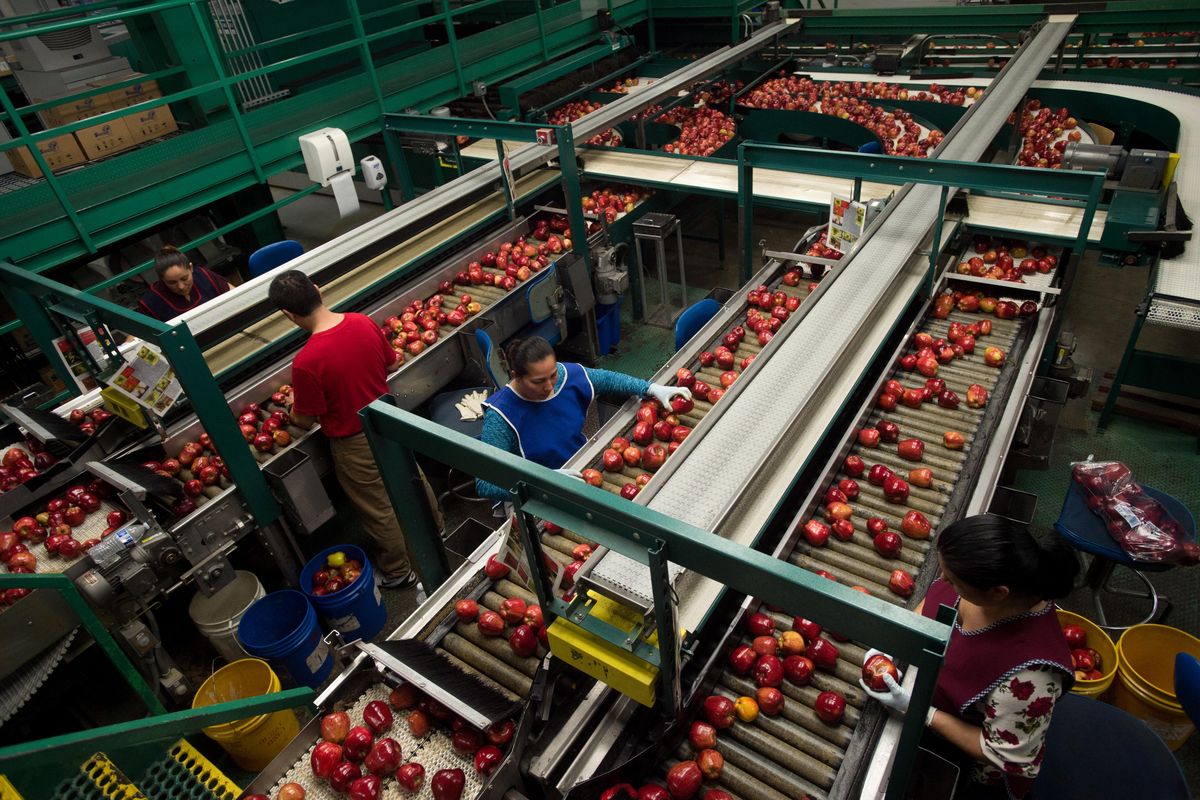High demand for apples keeps production workers on the line with new safeguards

WENATCHEE – In recent weeks, Nadia Manjares has been waking up at 4 a.m. to get ready for a 10-hour shift of packing apples, making sure people all over the country can buy the fruit at their local grocery store.
“The work is always heavy, but it’s been heavier because the company received a higher number of orders,” she said. Manjares has been working at Stemilt Growers for 16 years.
Two weeks ago, Washington had its largest volume of orders since 2015, shipping about 3.9 million boxes in one week, said Tim Kovis, communications manager for the Washington State Tree Fruit Association. A 40-pound box usually contains about 80 to 88 apples, depending on variety.
Although the overall demand for apples from foreign markets went down this week, the domestic demand is still greater than normal, making up for declines from trade disruptions to foreign markets.
“But it’s very difficult to know whether or not that (domestic increase) is due to the current COVID-19 issue or our ongoing trade issues that we’re facing,” Kovis said.
Packing warehouses have been following Centers for Disease Control and Prevention and state Department of Health guidelines, ensuring workers wash their hands properly and stay home if they’re not feeling well, Kovis said.
Manjares said they had been working Saturdays for about a month with the increased demand for apples, but they’re expected to go back to their regular hours:
“The majority of us didn’t want to go to work because we were scared with everything going on with the coronavirus, but it’s an essential job that needs to be done.”
Although Stemilt representatives declined a request for an interview, Roger Pepperl, the company’s marketing director, said in an email it’s important to be focused on every aspect of worker safety, especially during this time.
Stemilt has taken good measures to protect workers against the virus and has been screening for COVID-19 symptoms before work begins, Manjares said. If someone says “yes” to any symptoms, they’ll be sent home, but their available absences or sick days won’t be affected, she said.
People also have to sit about 6 feet apart while eating lunch, during breaks and while working in the packing lines, which can feel a bit isolating.
“We’re used to conversing, but we understand that … it’s for one’s own good, and we have to take care of ourselves to take care of our people, too,” Manjares said.
Guadalupe Peregrino works two jobs as a single mom of three children, the youngest 15, to put food on the table and keep up with bill payments. Six days a week, she works at Stemilt and three days a week, she cleans a local bank after hours.
“There’s a bit of uncertainty and fear to leave your home, but we know we need to keep moving forward and that life needs to continue,” Peregrino said.
She said she limits the time she spends outside of work, and people should remain home when they can to prevent the spread of COVID-19 and keep communities safe.
Peregrino normally works on the apple packing line, but was assigned two weeks ago to help disinfect office areas, bathrooms, eating areas, handles and rails with alcohol throughout the day.
She wears a mask and gloves while she cleans, so as not to inhale or absorb the alcohol she uses to go over previously disinfected areas, but the full-time cleaners use stronger chemicals and different mixes to disinfect every surface, she said
Lena Diaz, who works on the packing line at McDougall & Sons, also has seen the recent increase of fruit shipments. (Her name was changed for this story because she had concerns about losing her job.)
The work Diaz does in the packing line allows her to keep her distance from most people.
Although the company has issued social distancing rules and began screening for symptoms, there are a lot of employees, which makes Diaz concerned about her health.
“Right now, I feel fearful because I’m an older person and I have diabetes, and people have said it’s dangerous to be among large groups of people,” she said. “But I’m grateful to be able to have a job.”
Workers have been doing their best to make sure they can produce apples for families across the state, and so they can take care of their families, too, Manjares said.